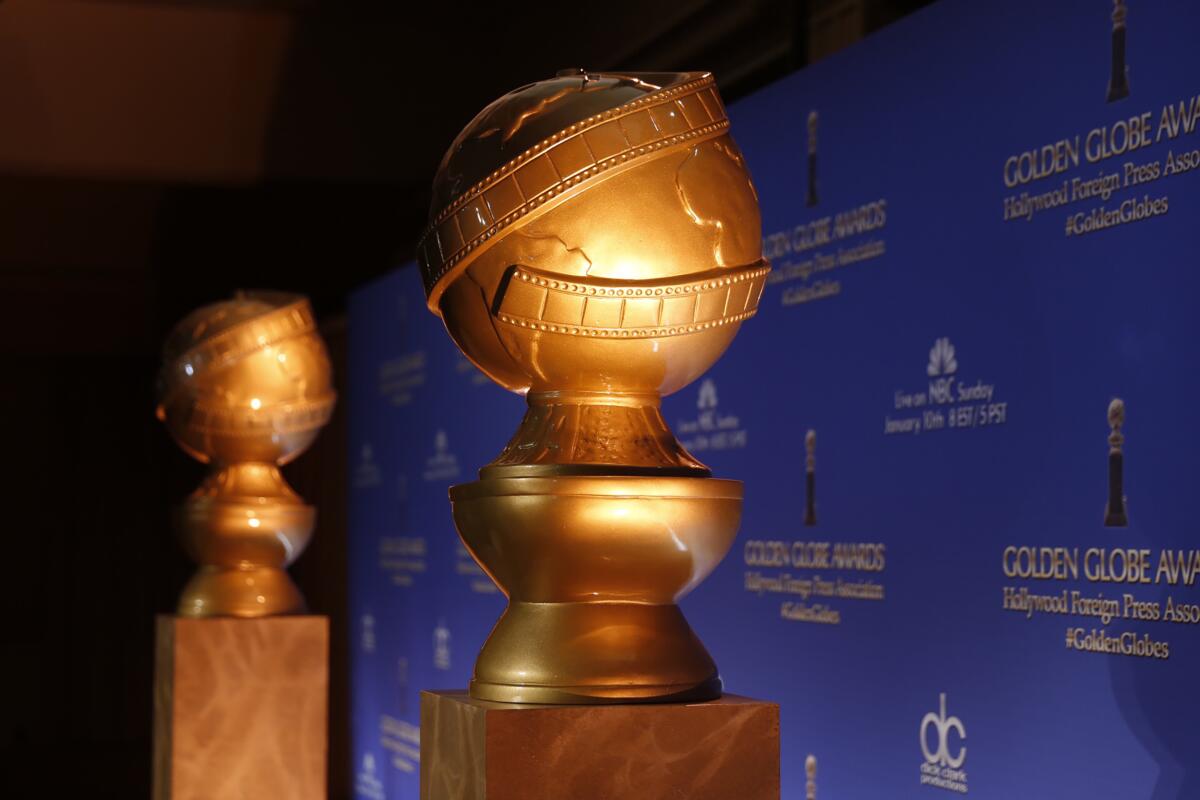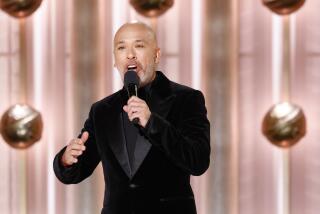This is what happened inside the Golden Globes show that wasn’t televised

- Share via
Long billed as Hollywood’s “party of the year,” Sunday’s Golden Globes more closely resembled an intimate tax attorneys’ convention.
Although the evening was black-tie, the usual fizzy mood was gone.
“This obviously felt different,” said one Hollywood Foreign Press Assn. member who declined to be named due to the sensitivity of the situation. The atmosphere, the member said, was more like the annual grants banquet where the HFPA announces the charities it supports.
“I think one of the magical things about the pre-pandemic Globes when there is a house full of celebrities is not only what happens during the live broadcast but during the commercial breaks. Those moments when you catch Spielberg talking to an up-and-coming TV actor. Those moments we obviously didn’t have — there were no commercial breaks and there were no celebrities.”
In a stark contrast to the usual Hollywood party, the Golden Globes were a “private event” at the Beverly Hilton that wasn’t even livestreamed.
Still rebounding from months of controversy triggered by a February 2021 Times investigation, largely shunned by the industry and hampered by a coronavirus surge, the HFPA held its 79th awards ceremony, for all intents and purposes, in the dark. There were no celebrities (at least outside of pretaped well-wishes from Jamie Lee Curtis and Arnold Schwarzenegger, separately lending support to the group’s charitable giving), red carpet, audience or marquee-name host onstage in the Beverly Hilton’s ballroom. The ceremony itself wasn’t broadcast on television nor was it livestreamed.
For members, used to being wined and dined over the years, the absence of food and drink during the ceremony only added to the somber mood.
“I think it’s pretty gutsy; the HFPA loves our food,” groused the member before the event kicked off, adding that they hoped to see a buffet of some kind at the poolside reception after the ceremony. “Unless Helen [Hoehne, HFPA president] wants to end up in the pool.”
Once the hottest ticket launching the award season, the decision to hold this year’s Globes had left many scratching their heads.
“When I was still a member, I totally opposed this idea,” said Wenting Xu, a former member from China, who resigned from the HFPA in protest last June, calling the group “toxic” and its reform efforts “window dressing.”
“The organization should focus on real reforms and not [try] to force the industry to think the HFPA is still capable of doing the Golden Globes even after NBC dropped it. But many members said, ‘The show must go on.’ I don’t think that was a wise decision. It just puts the whole association in the awkward position of giving out awards to talent and film studios without their support.”
In a statement, HFPA spokesperson James Lee said the association “never said that we wouldn’t announce winners on Sunday,” emphasizing that the group has “recognized the best in film and television during times of war and national crises — with or without an audience.”
In the absence of a telecast, the Hollywood Foreign Press Assn. announced the winners for the 2022 Golden Globe Awards during a small “private” event.
“This is a unique year,” Lee added. “We have fought hard to reform our organization from top to bottom. It is more accountable, diverse and inclusive than it has ever been. We’ve done some real soul-searching and all agree that reform and change did not stop on December 31st, and it won’t end in 2022. We’re in this for the long haul.”
As recently as Monday, a booker working with the HFPA was still reaching out to publicists in a fruitless attempt to ask stars to attend the ceremony.
Instead, the ceremony took place notably in the shadow of actor Tom Cruise having returned his three Globes while actress Scarlett Johansson urged her fellow actors to “step back” from the association. The usual galaxy of stars and boozy revelry was replaced with a focus on the HFPA’s philanthropic activities and its new five-year partnership with the NAACP to promote greater inclusion in the film industry. Presenters included representatives of arts organizations such as NewFilmmakers Los Angeles and the Latino Film Institute.
The evening was “more serious,” said the member, “but still a celebratory aspect of both art and philanthropy. I was impressed. I was really taken by the presenters because they didn’t just read a script; they participated in their presentations and spoke from the heart.”
And “it took about an hour and a half,” the member said with a laugh. “That might be something we want to keep for future, instead of going three hours.”
Outside of the ballroom, HFPA board member Jeff Harris was optimistic about the recent changes the organization has made to become more ethical and inclusive. He was quick to tout the 2022 Golden Globes’ “focus on philanthropy” and the HFPA’s efforts to help “underrepresented youth get into both journalism and to film.”
“A lot of work has gone into it, and we’ve taken some really great strides,” he said. “There’s more work to be done. We’re going to continue that work over the years. But I hope that people really see what’s been done, because it’s been significant.”
The HFPA has come under pressure for not having any Black members as well as allegations of ethical and financial lapses raised in a Times investigation.
Diederik van Hoogstraten, a former member from the Netherlands who resigned alongside Xu in June and remains critical of the organization, called the focus on philanthropy a “smart strategy.”
But, he added, “It doesn’t hide the practices in the association itself and it can’t distract from the fact that no one in the industry wants to be a part of this ceremony.”
Last year, the association implemented a series of measures and reforms including establishing new bylaws and a code of conduct, hiring its first chief diversity officer and adding 21 members — six of whom are Black journalists. In December, HFPA President Helen Hoehne told Vanity Fair, “This is the new HFPA 2.0.”
Many HFPA members supported the idea of hosting a stripped-down show and take issue with how they’ve been portrayed in the media, suggesting that the criticism has unfairly targeted foreign journalists in America.
Yet the HFPA has struggled to win back favor among powerful Hollywood publicists and studios. Some HFPA members have complained that they’ve had little communication or input with the group’s key decisions. One member said they only learned about this year’s Globes and its format by reading about it in the media.
Additionally, former members note that the HFPA has not curbed its practice of paying rank-and-file members for serving on committees.
The Times’ investigation revealed the HFPA has long funneled an increasing amount of money to the group, paying roughly $2 million to members in 2020 for serving on numerous committees and performing various tasks. The HFPA has said its compensation practices are in line with other nonprofit organizations.
Lee disputed that there has been a lack of communication with members and defended the continuing compensation.
“Members work hard throughout the year working on various committees that make the HFPA function,” he said in the statement. “They are also journalists who were out of work this year. Instead of writing, they spent hundreds and hundreds of hours creating reforms, getting them passed and put into place to ensure we became a diverse and inclusive Association whose members are now held accountable under a new Code of Conduct.”
But van Hoogstraten, who remains in touch with some in the association, remains unconvinced the HFPA has truly turned a corner.
“The people that have been in the ruling elite are still there,” he said. “They’ve shut the door, closed the windows, say, ‘There are no questions, let’s move on and go back to the Globes.’”
As the 79th Golden Globes wrapped with the traditional announcement of the best picture prize for dramatic film, this year going to Netflix’s “The Power of the Dog,” dozens of attendees poured onto the pool deck for the reception, where they were served sushi and various grilled delicacies, buffet-style. Department store-esque house music and lively chatter wafted up from the party as folks in tuxes and dresses warmed themselves by heaters and fireplaces.
Xu said the ceremony missed the point.
“For them, the main criticism is the lack of diversity, but I don’t think they understand the most important issue: They have to clean house.”
More to Read
Inside the business of entertainment
The Wide Shot brings you news, analysis and insights on everything from streaming wars to production — and what it all means for the future.
You may occasionally receive promotional content from the Los Angeles Times.













